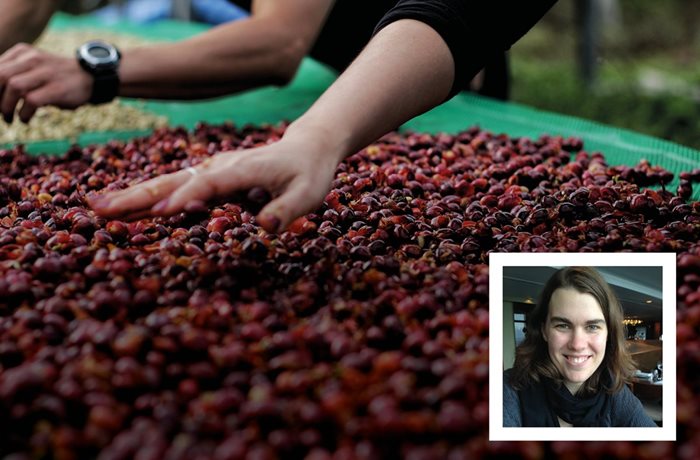Specialty coffee consumption continues to grow by leaps and bounds, but coffee growing itself is financially unviable for many farmers. Meanwhile, the quality of life in coffee growing communities lags well behind those in coffee consuming economies

Main image: Coffee farmers drying coffee cherries. Credit: Wynn Dhyana | Inset: Catherine David, Head of Commercial Partnerships, Fairtrade Foundation
The children of millions of smallholder coffee farmers are often choosing not to follow in the footsteps of their parents, and this has implications for our long-term supply of quality coffee. In this three-part series, 5THWAVE speaks with influential figures working to support coffee farmers at origin, to discuss the challenges facing coffee communities today and some of the solutions for ensuring the equitable and sustainable production of the coffees we cherish. First up, we hear from Catherine David at Fairtrade Foundation on the importance of fostering supply chain resilience and why it makes business sense for operators to supply certified coffees.
Catherine David
Head of Commercial Partnerships
Fairtrade Foundation
The Fairtrade Foundation started over 30-years ago as a people’s movement for change and coffee was the very first product we worked with. It was formed partly in response to crashing global market prices in the 1980s, when a group of Dutch trade justice campaigners united to create a fairer trade model. Since then, we’ve grown across multiple markets in more than 73 countries, with more than 750,000 coffee farmers worldwide benefiting from better prices.
The Fairtrade Minimum Price forms a financial safety net for coffee farmers, and is calculated through a transparent process that is inclusive of many different stakeholders in the supply chain.
During 20 out of the last 25 years, the world market price for coffee has dipped below the Fairtrade Minimum, which currently stands at $1.35/lb for natural Arabica coffee.
Today, the global market price hovers around less than $1/lb pound, which is hugely significant considering the average coffee farmer lives on around £1.37 ($1.87) a day, which is below the extreme poverty line.
Low prices are one of the biggest issues facing coffee farmers, but the climate crisis is also having a huge impact. Deforestation, erratic weather due to rising temperatures, water scarcity and the emergence of new pests all represent huge challenges globally.
"Coffee quality is a vital component of any coffee brand’s success and this relies on the ability of coffee farmers to invest in their business"
For example, many Colombian coffee producers are being forced to relocate entire farms to higher altitudes to find the right climate to grow their coffee. 2020 saw the worst Atlantic hurricane season on record. In Nicaragua, around 30% of crops grown have been destroyed by adverse weather and the drop in income has been devastating.
One of the merits of Fairtrade certification as a means of supporting farmers is that it is an effective, scalable way for consumers to know that the business or the brand they’re buying from has met a set of transparent sustainability standards.
Fairtrade certification also provides a track record and depth of expertise to understand the investments initiatives that can really help coffee farmers. For example, the Oromia women cooperative coffee farmers in Ethiopia earn carbon credits from using cleaner cooking fuel, so they invested their Fairtrade income in distributing 20,000 energy-efficient cooking stoves to cooperative members. In addition to cutting carbon emissions, reducing deforestation, and providing health benefits, the cooperative generated £192,000 ($262,000) in carbon credits during 2020.
The Fairtrade mark also offers significant benefits for partner coffee brands by demonstrating to customers that a brand is committed to paying a fair price to farmers and workers in their supply chain.
"Fostering supply chain resilience is hugely important for the long-term viability of coffee"
In the UK, 90% of consumers recognise the Fairtrade brand and 80% of these trust the Fairtrade Mark when making a purchase decision, which is much higher than many other ethical certifications. Carrying the Fairtrade Mark sends a message that customers can trust your products, and that your brand stands alongside some of the most recognised leaders of social justice in the world.
Coffee quality is another vital component of any coffee brand’s success and this relies on the ability of coffee farmers to invest in their business. Fairtrade coffee farmers receive the Fairtrade Premium, an additional sum calculated as a percentage of the volume of produce sold. In 2018, more than £166m was generated through sales and given back to producing communities for them to invest as they see fit.
Fostering supply chain resilience is also hugely important for the long-term viability of coffee brands. If a coffee farmer is unable to feed their family or plan their crop for the coming years, they’re likely to abandon coffee farming altogether. Fairtrade gives brands a simple and effective way of investing in their coffee supply chain and building long-term resilience for the coffee industry.
In part two we speak with Carlos Ortiz, Co-founder of Volcafe Way about the ways his company his helping to promoting sustainable profitability for coffee farmers.
This article was first published in Issue 6 of 5THWAVE magazine.
Subscribe to 5THWAVE to receive each edition in print and digitally or sign up to our newsletter and be the first to read the latest articles and updates on World Coffee Portal research
